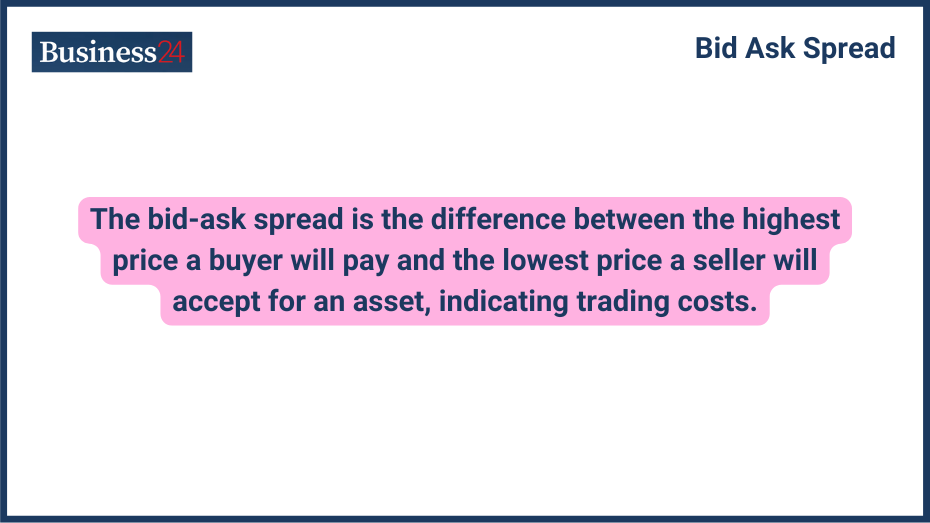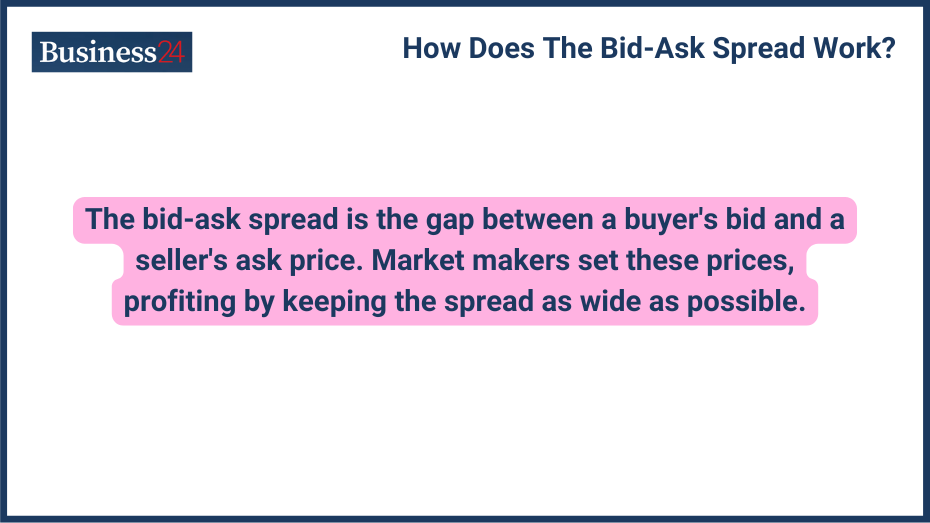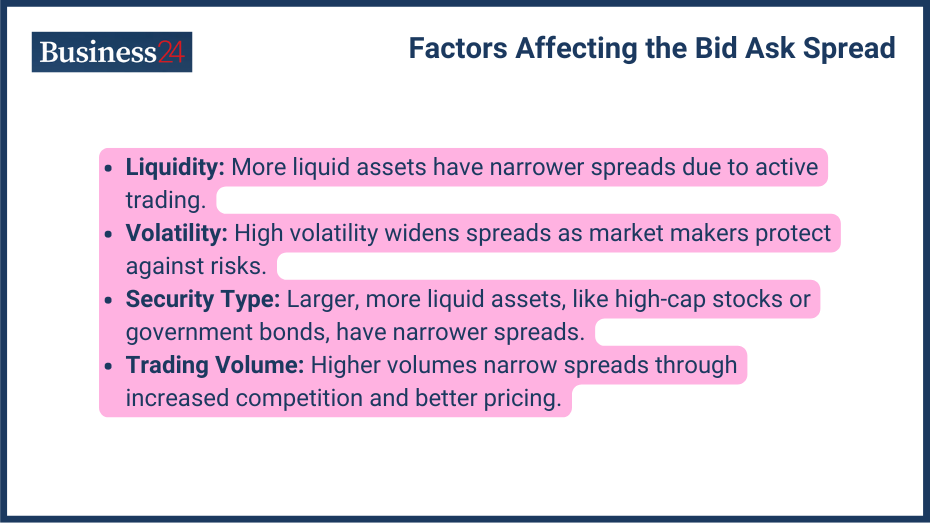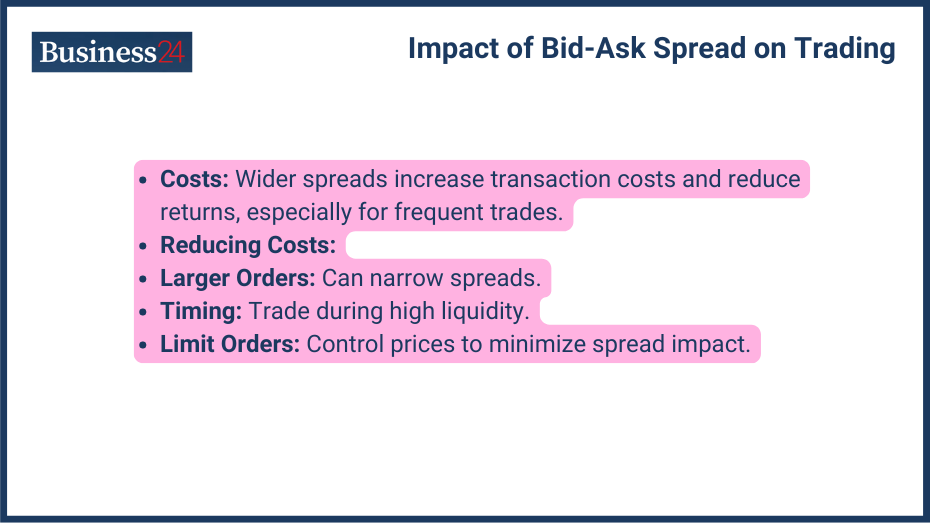
The bid-ask spread is the difference between the highest price a buyer will pay and the lowest price a seller will accept for an asset, indicating trading costs.
Various market and asset parameters are very important to an active trader, and some are used in every buying and selling transaction. Bid-ask is one such parameter that plays an important role in the exchange of an asset. The bid-ask spread is the difference between the highest price a buyer (bidder) is willing to pay for a security and the lowest price a seller (asker) is willing to accept. It represents the transaction cost traders incur when buying or selling a security.
Beginner investors or traders usually ignore the bid-ask spread, which can help them make better decisions while buying or selling. This tool can also help traders make their orders more efficient.
Importance in Financial Markets
The bid-ask spread directly impacts transaction costs as a hidden fee that traders unwittingly pay. Moreover, it serves as a barometer of market liquidity, with narrower spreads indicating more active markets and wider spreads suggesting less liquidity. Narrower spreads suggest a more active market with ample buyers and sellers, while wider spreads indicate a less liquid market with fewer participants.
All markets, including stock, forex, and bond, impact the cost of buying and selling stocks. A wider bid-ask spread can increase the cost of buying and selling stocks, reducing investors’ potential returns.
How Does The Bid-Ask Spread Work?

Buying vs. Selling Price
As I discussed earlier, the bid-ask spread reflects the difference between the price a market maker is willing to buy a security (bid price) and the price at which they are willing to sell it (ask price). When you buy a security, you pay the asking price, which is the higher of the two prices. When you sell a security, you receive the bid price, which is the lower of the two prices. The difference between the bid and ask prices is the bid-ask spread.
Market Makers’ Role and Influence on Spreads
Market makers are professional traders who provide liquidity to the market by quoting bids and asking prices for various securities. They can adjust their quotes to reflect changes in market conditions or their inventory, significantly influencing the spread. By providing liquidity, market makers help to ensure that there is always a buyer and seller for a particular security. However, market makers also have a profit motive. They profit by buying securities at the bid price and selling them at the ask price. Therefore, they have an incentive to widen the bid-ask spread.
Factors Affecting the Bid Ask Spread

Several factors can influence the size of the bid-ask spread, including:
Liquidity and Market Volatility
- Liquidity: Securities with high liquidity, meaning actively traded, tend to have narrower spreads. This is because more buyers and sellers are in the market, which increases competition and reduces the market makers’ ability to widen the spread.
For example, stocks traded frequently on a major exchange are typically more liquid than stocks traded infrequently on a smaller exchange. As a result, the spreads on highly traded stocks are often narrower than those on less traded stocks. - Market Volatility: Increased market volatility can lead to wider spreads as market makers become more cautious. During periods of high volatility, market makers may be less willing to take on risk and may widen the spread to protect themselves from potential losses. For example, during economic uncertainty, investors may be more hesitant to buy and sell securities, which can lead to wider spreads.
Security Type and Trading Volume
- Security Type: Different types of securities may have varying spreads. For example, stocks with higher market capitalization and trading volume tend to have narrower spreads than smaller or less actively traded securities. This is because larger, more liquid stocks are more attractive to investors, which increases competition among market makers and reduces the spread. Government bonds are typically more liquid than corporate bonds, so the spreads on government bonds are often narrower.
- Trading Volume: Securities with higher trading volume tend to have narrower spreads due to increased competition among market makers. When there is a high volume of trades, market makers have more opportunities to buy and sell the security, which can lead to narrower spreads.
Impact of Bid-Ask Spread on Trading

The bid-ask spread can have a significant impact on the profitability of trading activities:
Cost to Traders (Profitability):
- Transaction Costs: A wider bid-ask spread increases transaction costs for traders. This can reduce their potential profits or even lead to losses. When a trader buys a security at the asking price and then sells it at the bid price, they essentially pay the spread. This can erode their returns, especially for short-term traders or traders trading small quantities.
- Impact on Returns: The cost of the spread can erode an investment’s overall returns. Over time, the cumulative effect of the spread can significantly reduce trading’s profitability. For example, if a trader buys and sells a security multiple times, the cost of the spread can add up to a substantial amount.
Strategies to Reduce Spread Costs:
- Larger Order Sizes: Larger order sizes can often result in narrower spreads. This is because market makers are more willing to offer better prices for larger quantities. By placing larger orders, traders can potentially reduce the spread’s impact on their transaction costs.
- Timing: Placing orders during high liquidity periods can help reduce spreads. When there is a high volume of trade, there is more competition among market makers, which can lead to narrower spreads.
- Limit Orders: Using limit orders can help to control the price at which you buy or sell a security. A limit order specifies the maximum price you are willing to pay for a security or the minimum price you are willing to accept when selling a security. By using limit orders, you can potentially reduce the impact of the spread by only executing trades at your desired price.
Conclusion
Understanding the bid-ask spread is essential for all market participants, from individual investors to professional traders. By understanding the factors that affect the spread and implementing strategies to reduce its impact, traders can improve their profitability and make more informed investment decisions.
Key Takeaways
- Be Aware of Spreads: Know everything about bid-ask spread and all the functions and uses when trading securities.
- Liquidity: Choose securities with higher liquidity to benefit from narrower spreads.
- Timing: Place orders during periods of high liquidity to reduce spreads.
- Order Size: Consider placing larger orders to negotiate better prices potentially.
- Limit Orders: Use limit orders to control the price you buy or sell securities.
Disclaimer
eToro is a multi-asset platform which offers both investing in stocks and cryptoassets, as well as trading CFDs.
Please note that CFDs are complex instruments and come with a high risk of losing money rapidly due to leverage. 51% of retail investor accounts lose money when trading CFDs with this provider. You should consider whether you understand how CFDs work, and whether you can afford to take the high risk of losing your money
This communication is intended for information and educational purposes only and should not be considered investment advice or investment recommendation. Past performance is not an indication of future results.
Copy Trading does not amount to investment advice. The value of your investments may go up or down. Your capital is at risk.
Don’t invest unless you’re prepared to lose all the money you invest. This is a high-risk investment and you should not expect to be protected if something goes wrong. Take 2 mins to learn more
eToro USA LLC does not offer CFDs and makes no representation and assumes no liability as to the accuracy or completeness of the content of this publication, which has been prepared by our partner utilizing publicly available non-entity specific information about eToro.
